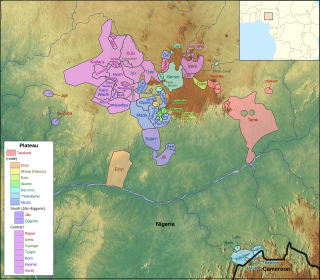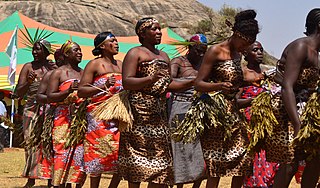Related Research Articles

Plateau is the twelfth-largest state in Nigeria. Approximately in the centre of the country, it is geographically unique in Nigeria due to its boundaries of elevated hills surrounding the Jos Plateau its capital, and the entire plateau itself.

The forty or so Plateau languages are a tentative group of Benue–Congo languages spoken by 3.5 million people on the Jos Plateau and in adjacent areas in central Nigeria. The original formulation included the Jukunoid and Kainji languages, and later the Dakoid languages; Jukunoid and Kainji now form a parent branch of Plateau called Central Nigerian (Platoid).

Bokkos is a Local Government Area in Plateau State, Nigeria. Its headquarters are in the town of Bokkos at 9°18′00″N9°00′00″E.
Cakfem-Mushere is an Afro-Asiatic language cluster spoken in Bokkos LGA, Plateau State, Nigeria. Dialects are Kadim-Kaban and Jajura. Mutual intelligibility with Mwaghavul is high.
Mundat is an Afro-Asiatic language spoken in Plateau State, Nigeria in Mundat village of Bokkos LGA.

Ron is an Afro-Asiatic language cluster spoken in Plateau State, Nigeria. Dialects include Bokkos, Daffo-Mbar-Butura, Monguna. Blench (2006) considers these to be separate languages.
Sha is an Afro-Asiatic language spoken in Plateau State and Kaduna State, Nigeria. As of 2018, the language is in use for face-to-face communication and has no standardized written form. The language is spoken by roughly 1000 people and is sustainable.
Ayere (Uwu) is a divergent Volta–Niger language of Nigeria, closely related only to Ahaan.
Sanga is a Local Government Area in Kaduna State, Nigeria. Its headquarters is in the town of Gbantu.
Kanam is a Local Government Area in Plateau State, Nigeria. Its headquarters are in the town of Dengi.
Bo language can refer to:
Nyong (Daganyonga), also known as Mubako and Bali-Kumbat, is a Leko language spoken in two well-separated enclaves in Cameroon and Nigeria. Cameroonian speakers consider themselves to be ethnically Chamba.
Eloyi, or Afu (Afo), is a poorly attested Plateau language of uncertain classification. It is spoken by the Eloyi people of Agatu LGA, Benue State and Nassarawa State in Nigeria.
East or Southeast Plateau are a "probable" group of three Plateau languages spoken in Nigeria. Fyam and Horom are closely related; connections to Barkul (Bo-Rukul) are more problematic.
Ahwai, also called the Ndunic languages, is a Plateau language cluster spoken to the southwest of Fadan Karshi in Sanga LGA, Kaduna State, Nigeria. Most villages are located at the foot of the Ahwai Mountains in Kaduna State.
Cara, also called Teriya after the village it is spoken in, is a small Plateau language of central Nigeria. Cara is spoken by about 3,000 people in Teriya village, Bassa, Plateau State, Nigeria.
Kuturmi, or Ada, is a Plateau language cluster of Kachia LGA, Kaduna State, Nigeria.
Hõne is a Jukunoid language spoken in Gombe State and Taraba State, Nigeria. Speakers of the two dialects, Pindiga and Gwana, can only understand each other with difficulty. It belongs to the Jukun Wapan (Kororofa) language cluster.
Kapya is a Plateau language spoken in Kapya village, Takum LGA, Taraba State, eastern Nigeria.
Nigbo is an extinct Plateau language of Nigeria. It was spoken near Agameti on the Fadan Karshi-Wamba road near Sanga LGA, Kaduna State. The language, listed in Blench (2012) and (2019), is not reported in Ethnologue or Glottolog. It is presumably an Alumic language based on its proximity to Akpondu, a language closely related to Alumu and Tesu.
References
- ↑ Barkul at Ethnologue (18th ed., 2015)
- ↑ Hammarström, Harald; Forkel, Robert; Haspelmath, Martin, eds. (2017). "Bo-Rukul". Glottolog 3.0 . Jena, Germany: Max Planck Institute for the Science of Human History.
- ↑ Blench, Roger. M. 1999. Field trip to record the status of some little-known Nigerian languages. Ogmios, 11:11:14.
| This article about Plateau languages is a stub. You can help Wikipedia by expanding it. |
| This Nigeria-related article is a stub. You can help Wikipedia by expanding it. |